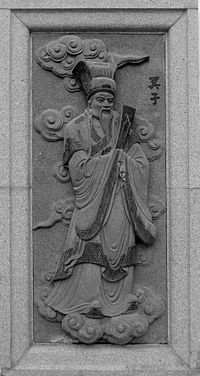Eight Prohibitions
| Eight Prohibitions | |
| Hangul | 팔조지교 |
|---|---|
| Hanja | |
| Revised Romanization | Eight Prohibitions |
| McCune–Reischauer | Eight Prohibitions |

Eight Prohibitions is a criminal law. When Shang people migrated to the Korean peninsula and established Gija Joseon, Saint politician Jizi from the Shang dynasty enacted this law to educate and strength the Korean people. This law was made up of eight prohibitions regarding etiquette, agriculture, rice farming, sericulture and weaving.
Contents
Although not all of the 8 prohibitions are known, the known part is as follows.[1]
- If you commit a murder you will be killed and compensate[clarification needed]
- If you commit an injury you must compensate with grain.
- If you steal something you will be enslaved.
Relationship between Nobi and Eight prohibitions
Korea's Nobi system was originated from eight prohibitions. Eight prohibitions prescribed that if someone steal something from others he/she will be enslaved. If that person is man, he will be No (Hanja: 奴) and if it's woman, she will called as Bi (Hanja: 婢). It means that the Nobi is an uncivilized person who violated the eight prohibitions and Yangban is the law-abiding civilized person. Therefore, it is the reason that Yanbang enslaved Korean as thought of the saints Jizi's purpose to educate them.[2]
References
- ^ Yukio Takeda, p. 256
- ^ Lee Young-hoon, p. 47
External links
- Yukio Takeda. 隋唐帝国と古代朝鮮 世界の歴史6. Chuokoron-Shinsha. ISBN 978-4124034066.
{{cite book}}: CS1 maint: ref duplicates default (link) - Lee Young-hoon. 大韓民国の物語. Bungeishunjū. ISBN 4163703101.
{{cite book}}: CS1 maint: ref duplicates default (link)
